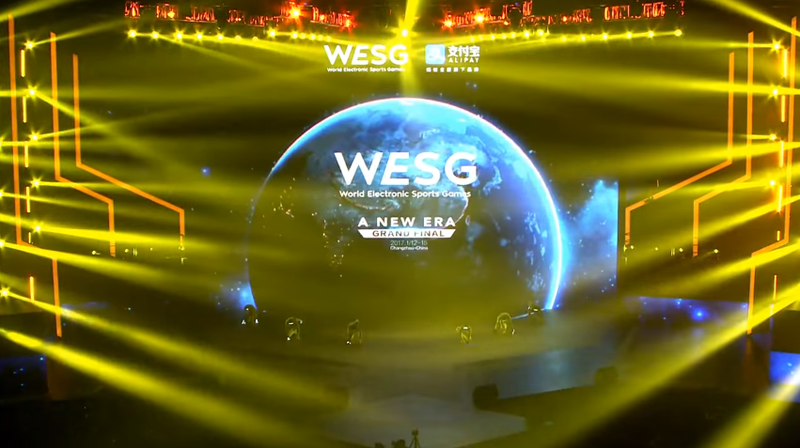
China has been building ghost cities, constructing man-made islands in the Pacific, and more recently diving head-first into the world of competitive gaming. When it comes to esports, the World Electronic Sports Games are entirely next level thanks to gigantic prize pools, unusual rules, and inconsistent live streams.
The WESG 2016 took place at the Changzhou Olympic Sports Center, a venue holding 38,000 that was originally constructed for the 2008 Summer Olympics. After months of regional qualifying, four groups of six teams each competed in tournaments for Dota 2, Counter-Strike: Global Offensive, Hearthstone, and StarCraft II. What the event seemingly lacked in forethought and production coordination, it made up for with its opening ceremony and prize money.
Despite being in its first year, however, the event was flush with cash thanks to its sponsor, Alibaba. It’s effectively China’s Amazon. It’s so profitable that the company formerly known as Yahoo! is able to survive solely based on its share of Alibaba stock. That’s why a moderate investment of $150 million by the Chinese ecommerce giant is able to manufacture an entire months-long series of international esports competitions with $5.5 million in prizes for the winning teams. Hopefully this guy got to share in some of Alibaba’s generosity.
Last night’s winners of each tournament walked away with more cash than most of their peers will win all year long (figuratively speaking of course—who knows when the prize money will actually be paid out). Big purses can’t buy a tournament prestige, but they can certainly make other people take note. Team EnVyUs, for instance, took first place at the WESG’s Counter-Strike tournament, and in so doing won $800,000, a sum that accounts for practically 50% of the team’s lifetime winnings to-date.
It was the same for the Philippines’ TNC Pro Team, whose past winnings were almost entirely due to a surprisingly successful performance at TI6, the biggest annual Dota 2 tournament crowd-sourced prize pools in excess of $20 million. TNC didn’t face anywhere near the same level of competition at WESG 2016 on its way to taking first place against Cloud9, but still earned $800,000.
This was due to the tournament’s nation-based competitive structure. Many of the best teams in Dota 2 and Counter-Strike, or any esport for that matter, draw from citizens from around the world. WESG, however, in a bid to do something that more closely resembles the World Cup or the Olympics, required the teams competing in it to all hail from a single country. Teams like TNC and EnVyUs, who already happened to meet this requirement, had a leg up as a result, while other dominant teams were forced to sit the event out. Instead of simply requiring the creation of new teams, like was done for the Overwatch World Cup, or just allowing teams to compete regardless of their countries of origin, the WESG’s hybrid approach left many disappointed, even after seeing that rad opening light show.
The effects were less severe for competitors in Blizzard’s Hearthstone or StarCraft II because the games are single player to begin with. In fact, Jun “TY” Tae Yang, who won the event’s StarCraft II tournament, and Euneil “Staz” Javiñas, who took first place in Hearthstone, are both teamless at the moment anyway, making their $200,000 and $150,000 prize winnings respectively that much sweeter.
And then there were the streaming issues. Some matches in some games were streamed live, while others played out in the background with no clear way to access them. Even in the Dota 2 finals last night, the English stream occasionally dropped off entirely, leading to the Philippines’ announcers doing double duty for a brief period. A Reddit thread even popped up where users debated “does the WESG count?” It would be easier to shrug off a lot of the criticism as simply English speaking audiences whining if it weren’t for the event’s ostensibly international focus.
But for the teams and players who placed in the top-four of their respective tournaments, and made out big as a result, I’m sure they’ll have no qualms about returning to the Changzhou center next year. I mean, just look at that guy shredding his heart out at the opening ceremony. Alibaba certainly hopes so, having announced last week a 10-year commitment to keep the WESG in China.



